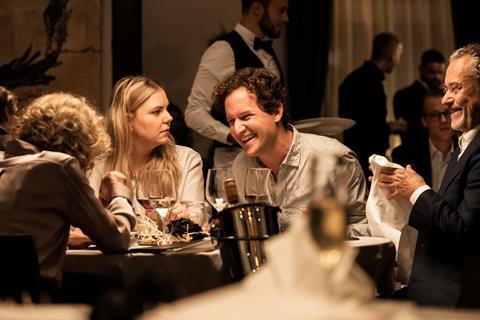A habitual fibber struggles to keep up with his own lies in Jons Jonsson’s second feature

Dir: Jons Jonsson. Germany. 2022. 112mins
Julius (Moritz Treuenfels) is a friendly soul and an intense people watcher. He’s the sort who takes an interest, whether it’s making sure visitors at the art gallery where he works don’t use their cameras, or offering new guy Erik (Thomas Schubert) some tips of the trade. An entertaining raconteur, it’s not just his attention that Julius is generous with, inviting his colleagues for a weekend sailing trip on his family’s boat. It seems a bit odd that he parks a hike away from the marina, but Julius has an explanation for everything… or almost.
Treuenfels glides into the multiple fictions of Julius’ life with the ease of a swan
This is just the tip of the iceberg of shiny imaginings from Julius’ life, which writer/director Jons Jonsson invites us into with his second feature after 2014’s Lamento. This unpredictable drama, designed to make us doubt our own judgement, was released in Germany after its world premiere in Berlin’s Encounters section, and is currently enjoying a festival run that could easily lead to further distribution or a streaming deal down the line.
Julius’ museum colleagues think he’s got a wealthy background, while other people who know him are sure he’s an architect who pulled himself up by his bootstraps. This latter assessment isn’t so far off the mark, but the only thing that Julius is constructing is a constantly shifting definition of himself. Jonsson emphasises the fact that pretending is one of the first lessons we learn, with Julius acting the part of a horse for a younger sibling.
Some of his fictions are of the everyday sort, too. That favourite anecdote which started as someone else’s story, or the myriad excuses you come up with when the rent is overdue. Others, meanwhile, are a lot more elaborate but, as Jonsson indicates, it’s not so much what people say as what others are prepared to believe that matters. Human interaction is a religion of sorts – you’ve got to have faith.
The Swedish writer/director is adept at wrong-footing the viewer too. When Julius assures his (non-wealthy) mum (Petra Welteroth) that he is dating an opera singer it seems faintly preposterous, but we soon see that Marie (Ricarda Seifried) is exactly as described. The ordinary look of the film also serves to reinforce the unsettling feeling generated by Julius’ compulsion, and Jonsson occassionally gingers things up with evocative sound design including the spin cycle of a washing machine that kicks in at just the right moment.
Treuenfels glides into the multiple fictions of Julius’ life with the ease of a swan and knows just how to change gear to show how fast his character is paddling to try to stay afloat. Julius’ likeability and general lack of any ulterior motive beyond the compulsion to create elaborate fictions becomes weaponised against us, as his shift to desperate measures makes us feel for him as much as those he’s leaving in his wake.
Stories of childhood feel like a trigger, pushing Julius in terms of just how far he is prepared to lie about his loved ones during a gloriously discomfitting dinner with Marie’s parents. Late in the film, there’s another story of childhood, intertwined with an act of faith, that strains the envelope of believability almost to breaking point. The longer you think about it, the more you suspect that’s part of Jonsson’s point. Even those who spin their own webs of deciet are not immune to the stories of others, especially when they have the possibility of being repurposed for alternative ends.
Production companies: Bon Voyage Films
International sales: The Playmaker Munich mhemminger@playmaker.de
Producers: Amir Hamz, Christian Springer, Fahri Yardim
Cinematography: Johannes Louis
Production design: Claudia Steinert
Editing: Stefan Oliveira-Pita
Main cast: Moritz Treuenfels, Ricarda Seifried, Thomas Schubert, Petra Welteroth, Max Themak






















![The Brightest SunScreen[Courtesy HKIFF]](https://d1nslcd7m2225b.cloudfront.net/Pictures/100x67/3/5/0/1448350_thebrightestsunscreencourtesyhkiff_312678.jpg)
